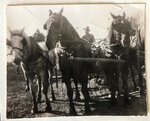

My grandmother told me stories of my great grandfather Norman Campbell. His parents homesteaded our farm in the 1850’s before Minnesota was granted statehood. When he was just a small child, the Dakota Indian uprising of 1862 took place. The story was that during this time in August of 1862, his parents kept the horses hitched to the wagon at all times fearing that they would have to flee to Rochester if news that the Indians were approaching. The horses remained harnessed with the buckboard packed and ready to leave at a second’s notice if necessary.
The Minnesota Indian War of 1862 caused the greatest loss of civilian life of any one incident until the terrorist attack of September 11, 2001 in New York. The corruption of Indian agents withholding payments to the Dakotah tribe was the catalyst for the uprising. Trading post owners would take the funds to be distributed to the Indians per the treaty agreement, and claim as payment for past debts. Some years they withheld nearly all the money. When desperate Indians tried to buy food on credit, one trader told them to eat grass. He was one of the first killed in the uprising of August 17, 1862. Little Crow the Dakota chief advised against the uprising but young braves were not dissuaded. Over the next couple weeks more than 800 settlers were killed in the New Ulm area as Indians attacked settlers farming there, before troops arrived and over powered the Indians. Thirty-eight Dakota braves were hanged in Mankato in December of 1862 for their part in the killings. Many of the settlers had been friends with the native Indians in western Minnesota and blamed the government for the war more that the Dakota Indian tribes.
There were more dangers lurking on the homesteaded farm one hundred and fifty years ago. One evening Norman brought the horses into the limestone barn which was cut into the hillside. As he went to scoop some oats out of the burlap bag sitting on the floor, he held the lantern up and saw there was a rattlesnake coiled up in the bag. Fortunately, he looked before he reached or I may not be telling this story here today. One afternoon in the late 1880’s, Norman found a number of rattlesnakes sunning themselves on the rocks along the bluff on the north end of the farm. He took a stout oak branch and cudgeled eighteen of the reptiles to death that day. His hunt must have been complete because I heard of no other rattlesnake stories on the farm. Never the less this story made quite an impression on me as a young boy and I explored the woods with a snakebite kit and my trusty .22 rifle.
My father also told of a story about Norman later in his life. He took the buckboard and horse to Mantorville one day for supplies and the hired man asked him to bring him back a plug of chewing tobacco and a bottle of whisky. One the way home Norman stopped by a number of the farms on the way and talked with the farmer and gave his horse a drink at the water trough under the windmill. As he visited, he would offer the farmer a nip from the bottle. After three or four such stops, he noticed the bottle was getting empty, so at the last farm he refilled the bottle from the hand pump and put the cork back in. The next time he went to town, the hired man asked him to buy the whiskey somewhere new because the last bottle was quite weak.